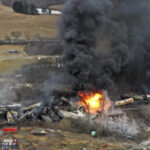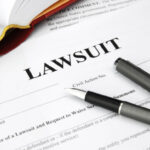As investigators try to piece together how a parked oil freight train broke free and demolished the heart of a small Quebec town last weekend, a barrage of litigation could soon be hitting everyone from the U.S. rail company to the Canadian government.
The key questions that will have to be answered in the coming weeks and months include whether any cases filed will be heard in Canada or the United States, which parties were most negligent and how liability for the crash is spread among them. Canadian authorities have launched an investigation and say they are looking into possible criminal negligence.
Fifty people are feared to have been killed when an unmanned train hauling 72 tanker cars of crude oil slid downhill from the town of Nantes and derailed in the town of Lac-Megantic on Saturday. Police have confirmed 20 dead, with 30 others still missing and a criminal probe begun.
It was the worst rail disaster in North America in more than two decades.
Lawyers say possible targets of litigation include train operator Montreal, Maine & Atlantic Railway, or MMA, its parent company Rail World Inc, and the train’s engineer; the town of Nantes; the supplier of the crude, World Fuel Services Corp ; and the Canadian government, which regulates the rail system.
But the first legal salvo will likely be fired over where the cases would be heard. While the catastrophe took place in Canada, the rail company is based in Maine, its parent is headquartered in Rosemont, Illinois, near Chicago, and the train was shipping crude from North Dakota.
The United States offers plaintiffs the prospect of larger recoveries than Canada, but they would need to prove a U.S. venue would be the most convenient and appropriate. Lawyers said that could be tough when the damages to the rural Quebec town and its residents would likely be at the heart of any suit.
‘A LOT OF INSURANCE’
Once the venue for any lawsuit is settled, the challenge for any plaintiff will be to establish negligence. The question for a court could be whether MMA acted appropriately in leaving the train unattended overnight in Nantes with an engine running, and whether the engineer applied all the appropriate safety procedures.
One focus, experts said, is likely to be on the handbrakes the engineer applied and whether they were sufficient to meet Canadian railroad regulations.
Edward Burkhardt, Rail World president and MMA chairman, said on Wednesday the engineer told him he had set 11 handbrakes before leaving the train for the night. “Our general feeling now is that is not true. Initially we took him at his word,” Burkhardt said.
Asked whether a potential failure to set or test enough handbrakes could increase MMA’s liability for the wreck, Burkhardt said, “We’re acknowledging liability. We’re not standing around saying we don’t have responsibility.
He said the engineer was under “police control” and that they had talked about prosecuting him. Police said on Wednesday evening that the engineer was not under arrest. Attempts by Reuters to contact the engineer were unsuccessful.
XL Group said on Wednesday that it was an insurer of MMA and its people were on the scene at Lac-Megantic working with the company and authorities. An XL spokeswoman declined to comment on the details of the policy.
“It is too soon to comment on the materiality of the losses,” she said in an email. XL is an insurance and reinsurance company registered in Dublin, Ireland, with executive offices in Bermuda.
Burkhardt told reporters on Wednesday: “We have a lot of insurance, and I’m not going to advise at this point what our limits are. I think our limits are going to be tested.”
FIRE ON THE TRAIN
After the engineer left the train at Nantes for the night, a fire broke out on one of the locomotives. In extinguishing it, the town’s fire department said it also shut down the engine to minimize the fire risk. As the engine had been powering the air brakes, they gradually lost pressure.
Burkhardt said initially the fire service should have contacted the engineer after turning off the locomotive, but he said later he did not think the firefighters had been negligent.
Any attempt to sue the town of Nantes for damages would have to establish that the fire service had not taken adequate steps to alert the railway, and that it should have known that switching off the engine risked brake failure.
Moreover, Quebec’s Fire Safety Act greatly limits the liability that can be imposed on a town.
“The statute has improved the municipality’s chances, but does it put them out of the reach of a lawsuit?” asked John Nicholl, a Montreal-based commercial liability lawyer with Clyde & Co. “No.”
Quebec police have launched a criminal investigation into the circumstances of the crash, but lawyers said they did not expect it would affect civil claims resulting from the accident.
Whether the crude supplier World Fuel Services would have any liability in the crash, said lawyer Dan Kirschner of Corboy & Demetrio in Chicago, would hinge on the amount of control it had of the rail cars and factors such as whether it was able to determine train personnel and shipping routes.
“If you have some type of ownership interest in the business that’s being performed, then it’s more likely that you can bring (claims against World Fuel Services) in that kind of scenario,” he said.
A spokeswoman for WFS declined to address the company’s liability.
Was this article valuable?
Here are more articles you may enjoy.

 Poll: Consumers OK with AI in P/C Insurance, but Not So Much for Claims and Underwriting
Poll: Consumers OK with AI in P/C Insurance, but Not So Much for Claims and Underwriting  Norfolk Southern to Pay $600 Million to Settle Ohio Spill Case
Norfolk Southern to Pay $600 Million to Settle Ohio Spill Case  Texas Among Several States Facing New Fire Risks: Weather Watch
Texas Among Several States Facing New Fire Risks: Weather Watch  Supreme Court Allows More Transport Workers to Bypass Arbitration and Sue Employers
Supreme Court Allows More Transport Workers to Bypass Arbitration and Sue Employers 